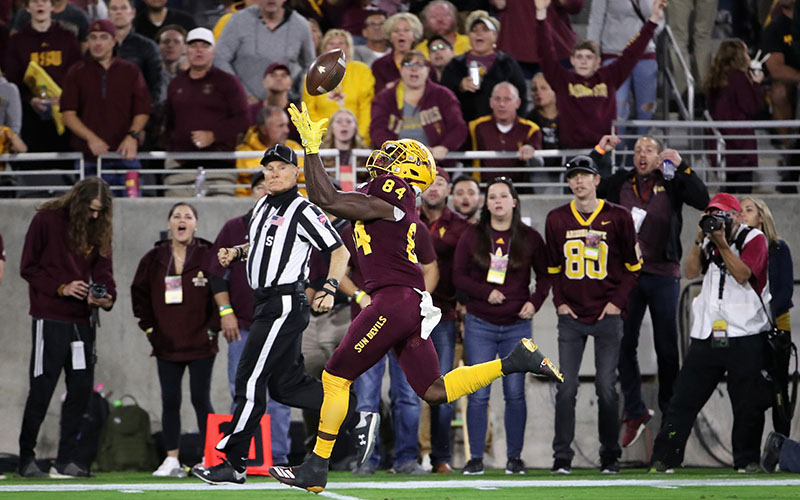
By Nick Hedges
PHOENIX – After postponing fall sports in August, Pac-12 CEOs called an audible Thursday and voted to play a shortened football season amid the COVID-19 pandemic.
Conference teams will compete in a seven-game season beginning Nov. 6. The Pac-12 Championship game is scheduled for Dec. 18, enabling conference teams to be considered for the College Football Playoff. No fans will be allowed in games.
“Our beacon was always going to be the health and safety of our student-athletes, including their mental health,” said Ray Anderson, Arizona State’s Vice President for University Athletics. “We were going to be relentless in the protection of our student-athletes.”
Anderson said he had yet to speak with Herm Edwards, but was sure the ASU football coach was “still jumping up and down somewhere.”
The conference was comfortable moving forward, Commissioner Larry Scott said, but added universities still need to work out with their home states how soon they can resume practice.
University of Oregon president Michael Schill said that while the conference is excited to forge ahead, it will carefully monitor COVID-19 cases in the Pac-12 footprint.
“We’re moving forward, but we’re not moving forward with our eyes closed,” he said.
Reports began spewing information around 4 p.m. MST, when the conference’s plans for a seven-game season came to light, which reversed earlier plans to cancel all sports throughout the fall semester.
A statement issued by the Pac-12 also confirmed that fans will not be allowed at the conference’s events until at least January, when it will meet again to discuss the pandemic.
Dr. Robert C. Robbins, President of the University of Arizona and a career cardiac surgeon, applauded Thursday’s decision.
“I am confident this plan to bring back fall sports can be successful,” Robbins said in a statement. “This step will provide a much-needed morale boost for the Arizona community and our fans around the nation.”
One school that will not be able to proceed right away with “necessary public health approvals” is Colorado.
Hours before Thursday’s vote, Boulder County, Colorado issued a public health order largely aimed toward students at the University of Colorado Boulder, prohibiting “gatherings of any size within the City of Boulder of anyone 18-22 years old.”
Specifically, Colorado’s football team will be unable to practice while the order remains in effect. It prohibits “outdoor exercise with a group in any form… for anyone 18-22.” Additionally, in the frequently asked questions linked with the order, Boulder County banned practices for local college teams because “this is considered a gathering.”
In a tweet, Sports Illustrated’s Pat Forde called Colorado “one of the more gung-ho schools for the re-start of football,” so this development raises questions about when the program can resume practices.
Orders like Boulder’s are the exact kind the conference has been working to overcome. Recently, California Gov. Gavin Newsom insisted that state-wide health orders weren’t keeping the state’s schools from playing, and Oregon Gov. Kate Brown issued an exemption allowing universities there to play football.
Additionally, according to reports, the California government agreed Thursday to expand their meeting limit to allow for football practices and games.
However, local orders and guidelines are proving to be a stronger obstacle. In particular, Stanford and California have struggled to get approval from local authorities in the Bay Area. Additionally, on the other side of the state, Los Angeles County’s guidelines still represent a tall hurdle for Southern California and UCLA to overcome.
Jon Wilner, Mercury News’ Pac-12 reporter and analyst, went as far as to tweet that “the Pac-12’s collective return has been undermined by UCLA’s upper administration not caring a lick about athletics.”
One thing that has been clear out of California is that players there want to play. USC quarterback Kedon Slovis, formerly of Desert Mountain High School in Scottsdale, helped lead an effort by the Trojans to get college football reinstated by Newsom.
“As we watched the NFL kick off over the weekend and our fellow college football players compete in the last few weeks, it left us wondering why we cannot join them,” USC players wrote to Gov. Newsom. “Our request of you is that you work with us — urgently and purposefully — to find a path forward for us to resume competitions later this fall so that we can have the same opportunity as other teams around the country to play for a national championship.”
Even with Boulder County’s order, there is a way back for the program. As things stand, the order is set to expire in two weeks on Oct. 8, so the Buffaloes cannot even practice or gather in-person until then.
With the season starting the weekend of Nov. 7, Colorado will have four weeks to prepare, barring an extension to the order. It is undoubtedly a tight window, but not impossible, especially when considering the Big 10’s timeline to its return to football.
One of the key’s in the Pac-12 decision, Dr. Doug Aukerman said, was increased testing because “the chance of spreading the disease diminishes. … That real made us more comfortable.”
About three weeks ago, the conference announced a partnership with a testing company that allows schools to test their athletes daily for coronavirus. The deal with Quidel allows for on-site rapid testing at each of its 12 schools and results in 15 minutesWe’re really excited to be able to return to play

